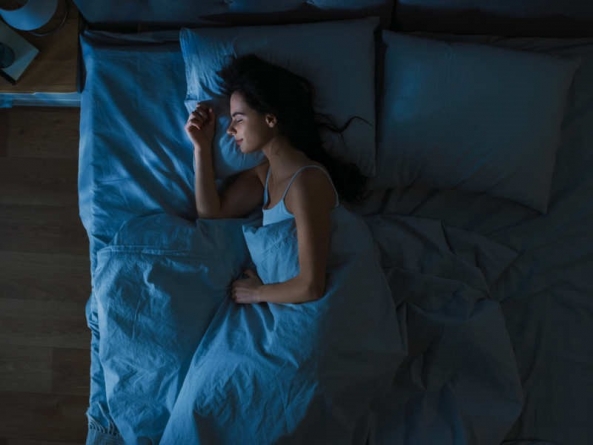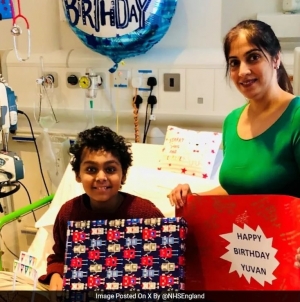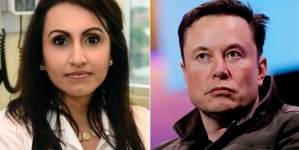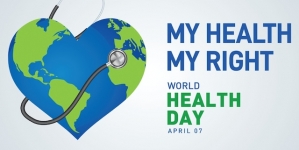-
LONDON: Indian-Origin Teen In UK Gets “Life-Changing” Cancer Treatment - 2 hours ago
-
SILICON VALLEY: All About Pavan Davuluri, New Head Of Microsoft Windows - 2 hours ago
-
LONDON: UK’s India Gate To Commemorate Role Of Indian Soldiers From World Wars - 1 day ago
-
HARARE: Shri Bramha Kumar appointed as the next Ambassador of India to the Republic of Zimbabwe - 1 day ago
-
LONDON: Indian-Origin Principal Wins UK Legal Challenge Over School Prayer Ban - 2 days ago
-
TORONTO: Indian-Origin Doctor Needs ₹ 2 Crore For Legal Fees. Elon Musk Responds - April 22, 2024
-
KINSHASA: India-Democratic Republic of Congo Foreign Office Consultations - April 21, 2024
-
LONDON: UK Court Allows Sale Of Nirav Modi’s Luxury London Apartment - April 21, 2024
-
TEHRAN: Travel advisory for Iran and Israel - April 20, 2024
-
LUXEMBOURG: Shri Saurabh Kumar concurrently accredited as the next Ambassador of India to the Grand Duchy of Luxembourg - April 20, 2024
HAGUE: Sleep Deprivation: A global pandemic
HAGUE: A Dutch study of nationally
representative sample of individuals in the age group of 18–70 years based on a
validated questionnaire of ICSD revealed that, among the total sample, 32%
complained of experiencing general sleep disturbances while 43.2% said they
suffered from insufficient sleep. A study conducted in Norway among 1285 high
school students (aged 16–19 years) showed an estimated 10.4% prevalence of
behaviourally induced insufficient sleep syndrome. In a recent survey, an
estimated 83.6 million adults in the United States were reportedly sleeping
<7h in 24h.
Chronic sleep deprivation is a growing public health concern. In the current
scenario, it affects most of our population, but young adults are more
vulnerable to acute sleep deprivation than older adults.
Many work cultures remain rooted in the myth that more work is better work with
current mindset of “If you snooze, you lose” &, as a result, sleep is
usually sacrificed in an effort to do & accomplish more. That is the reason
why coffee is consumed globally on a wider scale. Ambitious employees worldwide
log in long work weeks, surviving on large cups of coffee or any other
stimulants, & often are able to manage on five or six hours of sleep a
night.
Corporate culture often pushes long hours on the job expecting high
performance.
The sad truth is that sleep deprivation is an issue too often ignored, even
when sleep curtailment is associated with an increase in industrial accidents,
motor vehicle accidents, medical & other occupational errors.
It is difficult to find any other condition that has a greater impact on
productivity than sleep deprivation. In our present super-fast pace of world,
sleep has somehow become devalued.
Modern technology is certainly a large part of the problem. Smartphones,
tablets & computer screens all emit a bluish light, which drastically
suppress the production of melatonin, the hormone that controls the body’s
day-night cycle. So, reading in bed with any backlit device at night, actually
makes it harder to fall asleep & makes you more tired the next day.
Sleep Deprivation affects various systems:
Reduces Immune Function
Increases the risk of developing Diabetes, while optimized sleep duration &
quality may improve blood sugar control in people with Type 2 diabetes.
Increases risk of Obesity over time.
Associated with Cardiovascular Disease including High Blood Pressure, Coronary
Artery Disease, Heart Failure, while Sleep Disordered Breathing increases the
risk of hypertension & heart disease because of stress placed on the heart
due to multiple oxygen deprivation events throughout the night. The risk of
Stroke doubles with less than six hours of sleep.
Affects Mental Health, associated with depression, anxiety, stress & other
psychiatric disorders.
Reduces male testosterone levels & lowers sperm count, & decreases sex
drive, affecting Fertility leading to conception issues.
May increase the risk of some Cancers, such as Colon & Breast Cancers, with
a correlation between Sleep Apnea & Increased Cancer Risk of any kind.
Increases risk of Alzheimer’s dementia & accelerated disease onset.
Some people who are not getting adequate sleep daily may be suffering from an
actual sleep disorder. The most common are Sleep-Related Breathing Disorders,
particularly Obstructive Sleep Apnea, Chronic Insomnia, & Restless Legs
Syndrome. Reportedly, a sizable number of people with sleep disorders remain
undiagnosed or untreated.
The term ‘Sleep Disordered Breathing’ encompasses a range of conditions
characterised by abnormal breathing during sleep; ranging from intermittent,
partial obstruction of the airway without sleep disturbance (Snoring) to, at
the other end of the spectrum, frequent apneas (Cessation Of Breathing)
associated with repetitive hypoxaemia (reduction in oxygen levels) &
arousals leading to sleep disruption & daytime sleepiness.
Obstructive Sleep Apnea (OSA) is an independent risk factor for hypertension
& is associated with an increased risk of cardiovascular disease, abnormal
glucose metabolism, depression & sleepiness-related road traffic,
work-related & domestic accidents, contributing to increased morbidity
& mortality in the general population.
Sleep Disorders Clinic at Masina Hospital:
To identify patients who suffer from primary sleep disorders, like Sleep Apnea,
Insomnia, Restless Legs Syndrome, etc
To identify patients who suffer from Sleep Deprivation & assist in
improving their sleep patterns
To provide a holistic approach with multi-disciplinary management approach
towards sleep related disorders
TIPS for Sleep Hygiene:
Avoid caffeine, nicotine & alcohol before bedtime.
Avoid heavy meals within two hours of bedtime.
Avoid energetic exercise within three hours of bedtime.
If you can’t sleep after 20 minutes, get up & do something boring until you
feel tired, then try again.
Reduce extreme light, temperature, & noise in your bedroom.
Keep your sleep regular – same bedtime & same rise time.
Aim for 8 hours of sleep each night.
Avoid reading, watching TV or working in bed. Bedrooms are ONLY for sleep &
intimacy.
Take a hot water shower 2 hours prior to bedtime; hot water relaxes the body,
causing you to feel sleepy as body temperature drops























